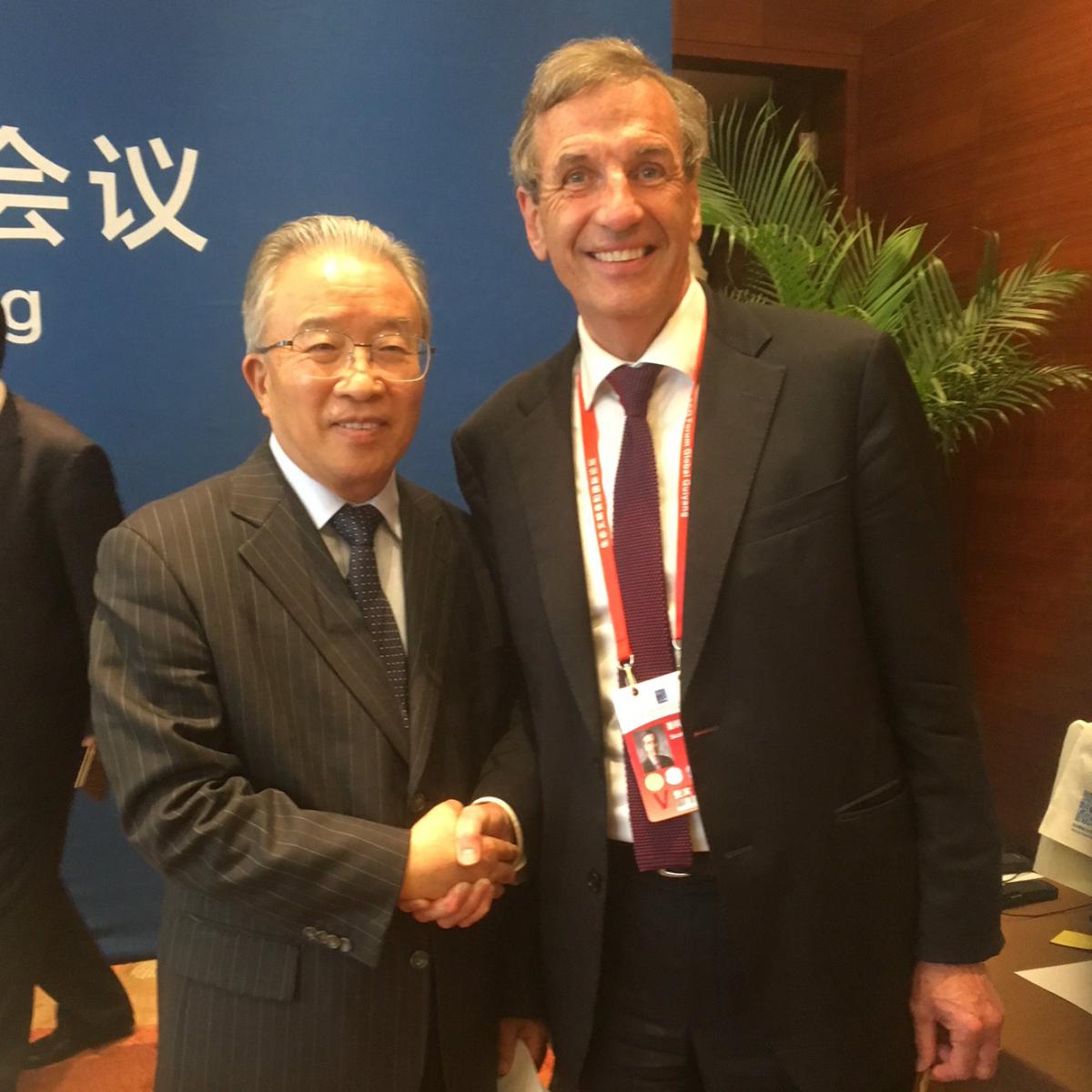China's War on Pollution—and What Comes Next
Insights on China's climate leadership following the 10th meeting of Eco Forum Global.
China is one key to advancing global sustainable development. China has set out ambitious targets to advance the Sustainable Development Goals (SDGs) and the Paris Agreement, and continues to share with the world its evolving concept of "Ecological Civilization."
China has declared war on air, water and land pollution and is deploying more stringent regulations, expanded air and freshwater monitoring systems, and tougher pollution enforcement action. It is also planning the largest expansion of urban planning in history to embed clean, low-carbon pathways. Dividends are being measured by way of cleaner air quality, especially in larger urban areas.
In late 2017, China launched the world’s largest climate market. The national climate cap-and-trade system will play a key role in peaking domestic greenhouse gas emissions by 2030. China is also moving to have one fifth of its energy supply sourced from renewable energy by 2030, as well as finding ways to leap-frog towards clean energy systems through greater use of geothermal and district heating, among other actions.
One critical pathway toward scaling up an ambitious, clean energy transition is via a financial system fit for ambitious climate objectives. China is the world leader in the greening of its financial system: it is the largest issuer of green bonds worldwide and is taking a systemic approach to greening the other parts of its financial system, including its insurance, stock market and underlying banking regulatory requirements.
China has reiterated its commitment to providing international leadership in implementing the Paris Agreement. In June 2018, together with Canada and the European Community, China co-hosted the second Ministerial conference on climate change, where countries worked towards a single, coherent set of rules for the Paris Agreement, addressing climate finance and other priorities.
China has also taken steps under the Belt and Road Initiative to explore low-carbon, green and circular economy approaches with partners. In partnership with UN Environment, China’s Minister of Ecology and Environment launched the Green Belt and Road Coalition in 2017 to explore sustainable development options to support greater South-South cooperation.
Protecting Nature
In 2020, China will host to a crucially important international summit on biological diversity, to take stock of the state and fate of biological diversity. The UN Convention on Biological Diversity adopted the Aichi Biodiversity Targets to conserve and protect land and marine ecosystems. Scientists are looking to the 2020 summit to substantially increase nature conservation targets. Many hope China, as host, instills the kind of urgency, ambition and creativity to biodiversity that Paris helped deliver in 2015 in tackling climate change.
Ecological Civilization
Many of these actions—from tackling climate change and protecting China’s fresh water, forests and mountains—are framed within China’s emerging concept of Ecological Civilization.
The 19th Chinese National Congress identified a number of comprehensive national environmental protection and climate mitigation actions to support Ecological Civilization. Actions reaffirmed in the 19th Congress included forestry conservation, increased marine protected areas, industrial planning to reduce air and water pollution, a commitment to national environmental monitoring and regulatory enforcement actions, and a host of others. In May 2018, Chinese President Xi Jinping noted that the concept of Ecological Civilization is at the centre of China’s actions to advance sustainable development and identified the overarching values as well as technical aspects of this evolving plan. President Xi has noted that "lucid waters and lush mountains are invaluable assets" that need to be preserved.
China’s ecological civilization embraces the three pillars of sustainable development—economic, social and environmental—and also includes notions of Chinese culture and history, as well as its political governance model.
Well-Being
An underlying aspect of Ecological Civilization is its focus on ecological protection and the means to balance economic growth—measured in indicators like Gross Domestic Progress (GDP)—with tools that account for ecological integrity and human well-being.
The most important meeting in which the strategic concept of Ecological Civilization has evolved is the Eco Forum Global. In July 2018, President Xi welcomed the forum, noting:
China is ready to work with the international community to realize the 2030 Agenda for Sustainable Development and build a clean, beautiful world.
At the 10th annual meeting of China’s Eco Forum Global, senior Chinese leaders and experts were again joined by international experts to examine specific areas of work.
An important focus of work is developing the tools and methods to strike a balance between ecological protection and GDP growth, specifically through emerging tools like ecosystem accounting and measurement.

At the July 2018 forum, senior experts from China’s National Bureau of Statistics, the Chinese Academy of Environmental Planning, UN Environment and others noted the importance of measuring genuine progress, through ecological or integrated accounting systems. There is an impressive range of work underway to value ecosystems, deploy real-time environmental indicators at the provincial and urban levels, and embed new accounting systems to track and conserve ecological systems.
At the Eco Forum Global, IISD presented its ongoing work to measure the fuller dimension of wealth beyond quarterly income flows. The Comprehensive Wealth report, released by IISD experts in 2016, remains one of the few country-specific reports to measure all four pillars that comprise a nation’s wealth: natural capital, human capital, produced capital and social capital. The findings of IISD’s work in Canada echoe the alarming findings of global trends, in which the stock of natural capital is declining by alarming rates: by as much as 25–30 per cent in the past decade.
In fall 2018, IISD will provide an update of this report, focusing on changes in natural capital wealth and the implications of continued losses.
You might also be interested in
Heatwaves to hit China once every 5 years as global extreme weather events multiply, study finds
Record-breaking heatwaves that have scorched North America, Europe and China are set to worsen in future unless the world stops burning fossil fuels, according to a study by the World Weather Attribution (WWA) academic initiative.
Can China Contribute to Climate Action in Latin America?
Sisi Tang discusses three climate action initiatives between China and Latin America: a crediting mechanism for clean energy, debt-for-climate swaps, and a greener free trade agreement.
Transition from fossil fuels to renewable energy can pose fiscal challenges for India: study
The global transition away from fossil fuels to renewable energy sources could trigger financial challenges for India and major developing countries such as Russia, Brazil and China because of their high dependence on revenues from fossil fuel, according to a study by the International Institute for Sustainable Development (IISD).
IISD Report: Shifting Away from Fossil Fuels Could Lower BRIICS Nations' Revenues
A new report by the International Institute for Sustainable Development (IISD), titled Boom and Bust: The Fiscal Implications of Fossil Fuel Phase-Out in Six Large Emerging Economies, looks at the potential financial ramifications of phasing out fossil fuels in six emerging economies — Brazil, Russia, India, Indonesia, China, and South Africa (BRIICS). They must begin adjusting their fiscal policies to account for declining fossil fuel use or risk a $278 billion revenue gap by 2030.
